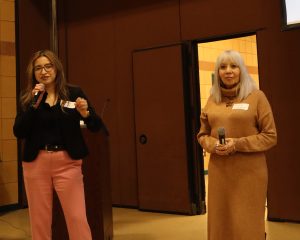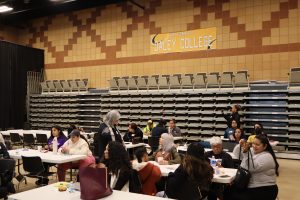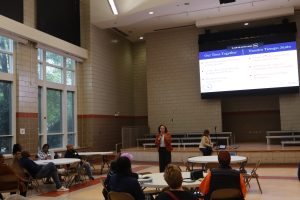Chicago Board of Education promises ‘transparent’ search for superintendent
By Igor Studenkov For Chronicle Media — June 4, 2025
Chicago Board of Education members Yesenia Lopez (left) and Emma Lozano address the attendees at the May 22 superintendent search hearing at the Arturo Velasquez Westside Technical Institute. (Photos by Igor Studenkov/for Chronicle Media)
As the Chicago Board of Education embarks on its first superintendent search in decades, it has launched an unprecedented public outreach — and it insists that it’s not just for show.
For the past three decades, Chicago mayors chose both the public-school CEOs and the board members. However, since the start of this year, the newly expanded board has been split between 10 elected members and 11 appointed members. A few weeks before the change took effect, the mayor-appointed board voted to fire CPS CEO Pedro Martinez — but his contract allowed him to stay on for six more months.
The same reforms that changed the makeup of the board gave it the power to hire Martinez’s successor. In April, the board voted to require that person to be licensed as a superintendent, saying that they want someone who has professional experience as an educator. The School Board is expected to appoint an interim superintendent before Martinez leaves June 18, and it already started looking for a permanent replacement.
Since mid-May, it has held 11 “community gatherings” to get ideas from the public. Attendees were gathered in groups where they were invited to share what they thought CPS was doing right, what could be better and what qualities and qualifications they would like the new superintendent to have.

The community gathering at Pilsen’s Arturo Velasquez Westside Technical Institute
Chronicle Media attended three of the gatherings — the May 20 session at Hairpin Arts Center in the Logan Square neighborhood, the May 22 session at the Arturo Velasquez Westside Technical Institute in Pilsen and the May 27 session at the National Teachers Academy on the Near South Side. All were well-attended and featured a cross-section of residents, parents, teachers, education reform advocates and elected officials. However, while board members described the process as transparent, members of the media weren’t allowed to quote or record anything the residents shared. Officials said that they wanted residents to be able to speak candidly, and that a summary of the comments will be released publicly later in June.
Superintendent search
At the start of 2025, the first step in the long-discussed school board reform took effect. The Chicago Board of Education went from having seven mayor-appointed members to 10 elected ones and 11 appointed ones. Each of those members represents one of the 20 districts, except one member who represents the entire city. During the 2026 midterm elections, Chicagoans will elect the board members to represent the remaining 10 districts and one at-large member.
Board member Jessica Biggs, who represents District 6B, which includes the Loop and several South Side neighborhoods near Lake Michigan, chairs the superintendent search committee. In her introductory remarks, she said that both elected and appointed members agreed on the process. This lined up with that Chronicle Media observed at Logan Square and Pilsen meetings, where both elected and appointed members addressed the audience.

Alma Advisory Group CEO Monica Santana Rosen addresses the crowd at the National Teachers Academy hearing.
Board member Emma Lozano, who was appointed to represent District 7A, which includes Pilsen and Little Village, said that “are all on the same page and we all believe that every child should have a world-class education, and that’s what we’re striving for.” The board, she said, agreed “to lead a transparent search that allows for community input” every step of the way, including how the candidates are evaluated.
The Board of Education hired Alma Advisory Group, a Chicago executive search firm, to help with the process. CEO Monica Santana Rosen said that, in addition to the community gatherings, her firm is doing stakeholder interviews and talking to community organizations, parent groups, Local School Councils and other entities that may want to weigh in.
Santana Rosen said that, while they would like to find a permanent superintendent by this fall, the deadline can be extended, if necessary.
“The board is not trying to rush the process,” she said. “[But], by July 2026, we expect that have the position filled.”
Santana Rosen said that the job application is online, and she told Chronicle Media that they already have several candidates.
“We expect to be interviewing candidates over the summer, for sure,” she said.
Community gatherings
The three meetings Chronicle Media attended followed the same general format. School board members and Alma representatives explained the process. Then, the attendee s were split into groups where they were asked the discuss five “key questions” – what do they love about their schools or the school district in general, what concerns do they have about their kids’ education, what were to top 2-3 improvements they would like to see either locally or district-wide, what skills or experiences the new superintendent should have, and whether there’s anything else the four questions didn’t cover that they wanted the board to know.
“[The board members] want community engagement to be authentic and meaningful,” Santana Rosen said during the Near South Side hearing. “We don’t just want to check a box tonight.”
The Logan Square and Pilsen hearings had Spanish-language groups, and professional translators provided live Spanish translations of the introductory comments. This was offered as an option at the Near South Side hearing, but unlike the other two meetings, there was no interest.
It wasn’t unusual for elected officials to participate in the groups as regular residents. Ald. Anthony Joel Quezada, 35th Ward, took part in a group at the Logan Square meeting, and Alds. Nicole Lee, 12th Ward, Jeylu Gutierrez, 14th Ward, and Byron Sigcho-Lopez, 25th Ward, each joined a different group at the Pilsen meeting, as did Cook County Commissioner Alma Anaya (D-7th).
“It was a good opportunity for people to voice their opinions,” Gutierez told Chronicle Media afterwards. “It’s important for the community to be engaged and be part of the process.”
Some board members participated in conversations, while others, like Biggs, simply went from group to group to listen in.
“I am very proud and excited about the new process,” Biggs told Chronicle Media. “Each session had 30-100 participants. The format, I think, really allowed authentic voices to rise to the surface, and I’m eager to hear the [feedback].”
The group discussion format has become standard for Chicago planning processes. But the discussion usually concludes with the attendees reconvening and one person from each group summarizing their answers to questions. For the CPS superintendent search, not only did the groups not reconvene, but Alma representatives said that the group discussions couldn’t be photographed or recorded, even by members of the media.
At the Logan Square meeting, Alma senior associate Deirdre Hargrove-Krieghoff said that it was because “folks need feel comfortable, to be safe and speak the truth.” At the Pilsen meeting, another Alma representative said that they wanted attendees to share their perspectives “without fear of their pictures or their words being recording or shared out of context.”
Biggs told Chronicle Media that the notes taken during group conversations will, at least in general terms, eventually become part of the public record.
“The summaries of their conversations will be posted on the board website,” she said.
For information about the superintendent search, visit https://www.cpsboe.org/supt-ceo-search







